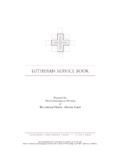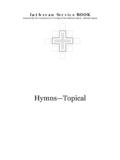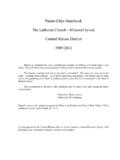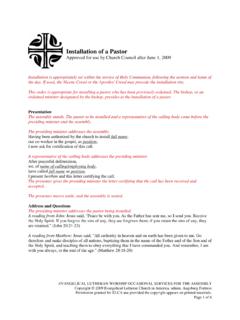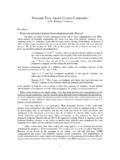Transcription of The Public Reading of Scripture in the Divine Service
1 The Public Reading of Scripture in the Divine Service CTCR of LCC (2008) Introduction In June 2002 the Sixth Convention of lutheran Church Canada adopted resolution which referred the question of the Public Reading of Scripture to the Commission on Theology and Church Relations for response and direction. Both the overture that served as a basis for the resolution and the resolution itself recognize that the church in recent years has not followed a consistent practice with regard to the Public Reading of Scripture in the Divine Service . In some congregations only the pastor reads the appointed lessons. In other congregations the pastor or one of the men in the congregation may read the lessons. In still other congregations anyone may read the lessons.
2 It is because such confusion exists that the CTCR was asked to prepare this document. Even though there is still no consistency or uniformity with regard to the Public Reading of Scripture in the congregations of lutheran Church Canada, this is not the first time that the CTCR has addressed this issue. In September of 1985 the Commission on Theology and Church Relations of the lutheran Church-Missouri Synod published the document, Women in the Church. At the first regular convention of LCC (1990) this document was accepted along with all LCMS CTCR documents in the same sense in which it was originally received (Resolution 90 ). In addition to this, in January of 1999 the Commission on Theology and Church Relations of lutheran Church Canada published the document, The Role of Women in the Church.
3 This document was adopted for reference and guidance at the fifth convention of LCC (1999). Although these documents did not deal extensively with this issue, they did address it briefly. However, since some confusion still exists regarding who may properly read the Word of God publicly in the Divine Service , and since the Synod in convention has asked the CTCR to study the issue, the CTCR has sought to provide an answer which is consistent with the teaching of Scripture and the lutheran Confessions. It must be stated at the outset that an answer to the question has already been given. In the document entitled Women in the Church the CTCR stated that there are certain specific functions which should not be carried out by the laity (who may hold auxiliary offices) but which are to be exercised by the pastor.
4 Among them are the following: 1) preaching in the services of the congregation 2) leading the formal Public services of worship 3) the Public administration of the sacraments 4) the Public administration of the office of the keys. (emphasis added) That the above mentioned prohibitions (specifically the second) include the Reading of Scripture in the Divine Service is made explicit when, in the same document, the CTCR states, it is the opinion of the CTCR that the Reading of the Scriptures is most properly the function of the pastoral office and should therefore not ordinarily be delegated to a lay person, woman or man. Of course, one must recognize that there may be emergencies which arise when no pastor is present. When no pastor is present, the congregation must choose between not hearing the Word of God at all and taking the unusual step of requesting a layman to read.
5 Obviously, it is preferable not to have to make such a choice, but when one is faced with such a dilemma, one may need to make such a decision. Emergencies, however, do not determine the The Public Reading of Scripture in the Divine Service 2 teaching or the practice of the church. Scripture and the Confessions do that, and ordinarily the pastor will officiate in the Divine Service . In spite of what has been said, however, it is clear that the opinion of the CTCR has either been overlooked or not understood. It is the hope of the CTCR that this document will enable those who read it to understand the Biblical and Confessional teaching concerning this issue and to rejoice in the same. In an effort to expand upon what has been said before, this document will examine in detail 1 Timothy 4:13, which was the passage referred to in the overture submitted to the 2002 convention, and then examine that passage in the context of the Scriptural and Confessional doctrine of the Office of the Holy Ministry.
6 I Timothy 4:13 While on his way to Macedonia, Paul had urged Timothy to remain in Ephesus in order to charge certain persons not to teach any different doctrine. Timothy was St. Paul s associate. St. Paul calls him his brother, co-worker, and, at one point, perhaps even an Whatever his exact title may have been, and these were perhaps not always the same titles we would use today, it is clear that he held an ecclesiastical office. The Office of the Ministry was committed to Timothy by the laying on of hands,2 and he was charged with the responsibility of ordaining other Yet, although St. Timothy received his call mediately through the hands of men, he was nevertheless called by God. For in Acts 20:28 St. Paul says to all the elders of the church of Ephesus, The Holy Spirit has made you overseers, to care for the church of God, which He obtained with His own blood.
7 Furthermore, in 2 Corinthians 5:18-20 St. Paul says, God has given to us the ministry of reconciliation..Therefore we are ambassadors in the name of Christ, with God appealing through us. It is significant that he makes this statement in the plural because it refers back to the opening sentence of the Epistle which identifies Paul and Timothy as the senders. Thus, Paul and Timothy both hold this office. Clearly, since Timothy had been lawfully called and ordained through regular means through Paul and the presbytery, he had been called and sent by God Notwithstanding the fact that Timothy was St. Paul s co-worker and fellow minister of the Gospel, he was subordinate to the Apostle. He is St. Paul s emissary and is frequently sent by him to various churches.
8 That is also the situation in the First Epistle to St. Timothy. J. N. D. Kelly states that St. Timothy was an apostolic delegate in temporary charge of the church in Ephesus5 armed with plenipotentiary authority6. 1 Timothy represents him as presiding over the Ephesian congregation with the task of re-establishing the sound tradition of Christian 1 The First Letter to the Thessalonians is addressed to the church of the Thessalonians from Paul, Silvanus, and Timothy. 2 Thessalonians 2:6 reads, nor did we seek glory from men, whether from you or from others, though we might have made demands as apostles. Together with Paul, Silvanus and Timothy were co-founders of the church at Thessalonica.
9 2 1 Timothy 4:14 and 2 Timothy 1:6. 3 2 Timothy 2:2. 4 Cf. Martin Chemnitz, Loci Theologici, trans. J. A. O. Preus (St. Louis: Concordia, 1989), II:700-701. 5 J. N. D. Kelly, A Commentary on the Pastoral Epistles (Grand Rapids: Baker, 1986), 2. 6 Kelly, 6. The Public Reading of Scripture in the Divine Service 3 teaching in the face of divisive heretical tendencies, and to organize the ministry and the daily life of the congregation on a proper basis. 7 It is in this context that St. Paul charges St. Timothy, Until I come, devote yourself to the Public Reading of Scripture , the preaching, and the teaching. Here Paul specifies the tasks with which Timothy is to occupy himself during his sojourn in Ephesus. He will be engaged in the work which the apostle has assigned to him until the apostle himself arrives to take over the responsibility.
10 In the Second Letter to the Corinthians St. Paul catalogues his sufferings for the sake of the Included in that list is his constant anxiety for the churches. He had good reason to be anxious. As he would prophesy in the sermon recorded in the twentieth chapter of the Book of Acts, I know that after my departure fierce wolves will come in among you, not sparing the flock; and from among your own selves will arise men speaking perverse things, to draw away the disciples after them. The church in Ephesus was in trouble for this very reason. The people were listening to teachers who taught a different doctrine, a doctrine of demons. They had departed from the apostolic Gospel. Paul, therefore, sent Timothy to this troubled church.

